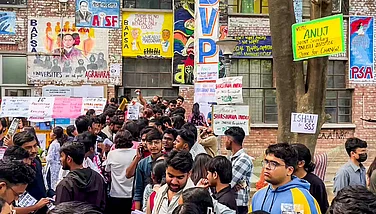In its 75th year, XLRI, one of India’s top business schools, marked another milestone in its illustrious history. With a student of the Batch of 2020-23 reaching the Rs 1.10 Cr pay package mark, new standards were set.
Flagship Programme: PGDM (BM) & PGDM (HRM)
XLRI Jamshedpur and XLRI Delhi NCR has successfully achieved 100% placements for the outgoing batch of 2021-23 for its flagship programs Two-year PGDM (BM) and Two-year PGDM (HRM) with all 463 candidates securing offers through the Final Recruitment Process. The Final Placement process was conducted in two stages. The first stage - the Lateral Recruitment Process (LRP) – was conducted over a week in January 2023 where students with prior work experience were interviewed and were offered higher than entry-level positions. The second stage – the Campus Recruitment Process (CRP) – was conducted in a single day in February 2023 where there was no segregation basis the work experience. The process saw participation from 117 recruiters with 484 domestic offers and 3 international offers, including 30 new recruiters. These also include pre-placement offers (PPOs) which were offered to 43.8% of the batch on the basis of their performance during their Summer Internships. The students from Jamshedpur and Delhi NCR campuses participated in the placement process.
Executive Programme: PGDM (GM)
The placement drive for XLRI’s 15-month flagship MBA programme for the 2022-23 cohort was a resounding success. The cohort of students brought with them a wealth of diverse experiences, having previously excelled in various roles such as Project Management, Product Management, Consulting, Marketing, Software Technologies, Supply Chain, and HR at renowned companies including Fortune 500 firms, Big 4 consulting firms, Unicorns, and other industry-leading organisations. Furthermore, the average work experience of the cohort was 7 years, with an average age of 29.
We are delighted to share that XLRI’s PGDM (GM) program witnessed a notable increase of 11% in the average CTC, reaching ₹29.40 LPA, and a 6% increase in the median, reaching ₹27.50 LPA, during this Campus Placement Season. The highest salary offered reached a record high of ₹80.35 LPA, with the top 10% of students earning an average of ₹55.27 LPA, the top 25% earning ₹41.90 LPA, and the top 50% earning ₹35.89 LPA during the recruitment process.
The institute received overwhelming response from industry leaders, including Amazon, Jio, Mahindra & Mahindra, TVS, Trident, Deloitte, Accenture, ServiceNow, Axis Bank, among others, who actively participated in the recruitment process. The Class of 2023 was offered a range of roles, encompassing positions such as Chief People Officer, Assistant Vice President, HR Leadership Development, DGM – National Academic Operations, CMI - Group Digital Channels and Partnership, Senior Product Manager, Senior Project Manager, Manager- Delivery Excellence, Relationship Manager, Senior Consultant, Digital Strategist, Business Process Improvement, and Strategy Program Management.
What powers this excellence year on year is a no-compromise focus on making students industry-ready in the truest sense, balancing industry demands and ensuring the institution continues to serve the needs of its stakeholders.

Ready for industry
All B-Schools try and make their students as industry-ready as possible. With the economy in overdrive, most institutes do achieve over 70 per cent placement. But, the challenge at XLRI is different. The job profile expected by the student or the institute is not a typical entry-level job for a two-year MBA graduate – those CTCs are not commensurate with XLRI achievables. At the same time, at the most 60-70 per cent of the batch have work experience and that too of a maybe two to three years at most.
In order to make a near-fresher industry-ready at the level that is expected, the definition of industry-readiness changes. Students need to be trained such that they can handle responsibility from day one. They need to demonstrate knowledge of at least some of the basic elements of business, the willingness to learn and high adaptability.
Industry-readiness also means being aware of what industry needs. Towards that end, XLRI is continuously striving to maintain a strong relationship with companies across domains. One input source is XLRI’s strong and widespread alumni base, who give unstintingly of their time to share their experience and insights.
This takes a variety of forms ranging from engagement in guest talks, in live projects. It must be remembered that the student body is made up of extremely meritorious individuals who have cracked one of the toughest competitive exams in the country. With their natural talents and the guidance of the institute, students actively try to understand how business works. They procure problem statements from companies and solve these problems remotely. They actively participate in a large number of industry-conducted competitions – case competitions, problem-solving, simulations and so on. All this not only increases their practical knowledge base, but gives them an edge when it comes to placements.
The institute also places great emphasis on the summer internship at the end of the first year by reaching out to the industry’s best organisations. This is because, summer internships result in jobs for 65 to 70 per cent of students. These internships at the best companies provide students the opportunity to experience direct business And, it provides companies a close-up of a potential recruit.
This exposure to the real world also enhances students’ confidence as they are not only able to evaluate themselves, but also their institute and the education it provides. They meet students from other schools, they go for competitions where they win against 25,000 students from across schools. They know where they stand with respect to their peer group. This is a major factor in XLRI’s placement performance.
A fine balance
What then is the challenge when it comes to placements? “Managing expectations. Enormous expectations. From the students, the industry and the institution itself”, says Dr A. Kanagaraj, Convenor Placements [BM, HRM and GM]. The Placement Cell confirms this, saying, “Students today have extremely detailed specifications – this company, this role, this location, this CTC, this salary breakup, this career path. For internships, they want to know how much stipend, stay - guest house or star hotel, airfare, travel allowance, reporting officer and so on and so forth. Unless they are fully satisfied, they will not agree to anything. Multiply this by 600 students every year.”
This change was inevitable once the placement process is institutionalized into an inherent activity – a must for accreditations and rankings – from an add-on activity as earlier.
As an institutional activity, XLRI treats the process of placement with utmost seriousness. Especially because the institute needs to meet the expectations of industry as well.
Companies are extremely demanding – and competitive - as well. The Placement Cell informs us that post COVID, companies expect every new recruit to be able to leverage the power of new technologies - be it data analytics, artificial intelligence or metahours. To address this industry expectation, XLRI has started training students for technology as well. An institutional subscription to a global digital learning platform has democratized access to technological value-addition for the students – this gives access to 11,500 courses free of cost.
The primary challenge with regard to industry is that companies expect all 600 students in a batch to be made available. Then, the top 10 to 20 percent becomes a common choice among multiple recruiters. Some profiles also attract competitive attention – students with very high CGPA, with an IIT or Lady Shriram background. “Competitions for certain candidates have often escalated to CEO and Chairman levels”, laughs Dr Kanagaraj. Also, each company expects preferential treatment during the process. A surefire formula for a lot of unhappiness.
However, the performance of XLRI students leaves no room for complaints and the next year, the same companies come back, hoping to recruit some more outstanding XLRI students. This in turn feeds organizational goals of both intake and placement.
The feedback factor
Industry satisfaction with XLRI students is very high. And the main reasons that differentiates them from other management school graduates is their attitude towards work and learning. As per industry feedback, XLRI students are always pursuing knowledge and their ability to work with few resources is superb. But perhaps the most significant differentiator is that XLRI students are excellent team players, with a very high human touch.
Endnotes
Perhaps the best validation of this comes from a stalwart in the industry and an XLRI alumni to boot. Raj Narayan, an alumnus of XLRI who retired as the Chief Human Resources Officer of Titan, says, “That human touch, that understanding of team dynamics, that XLRI students have is unparalleled. With half the cohort being HR, with faculty also being HR-driven, human-centric values and approach become inculcated and ingrained. Even the most hardcore marketing and finance students will be fantastic team players, will bring a greater human quotient into their role and their domain. And that will change the culture of my organizations for the better, which as an HR person, is important for me. That is why we hire from XLRI.”


























